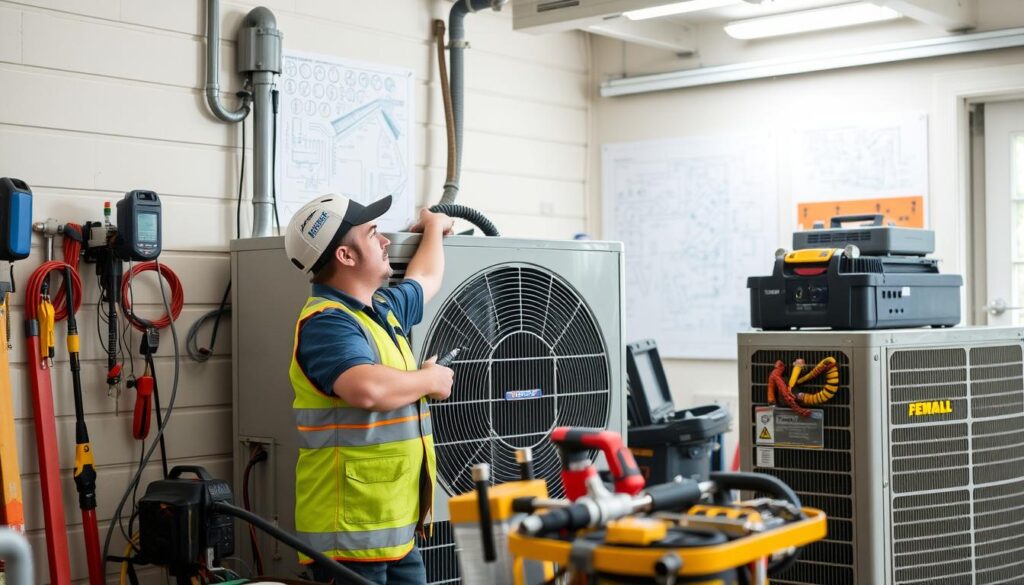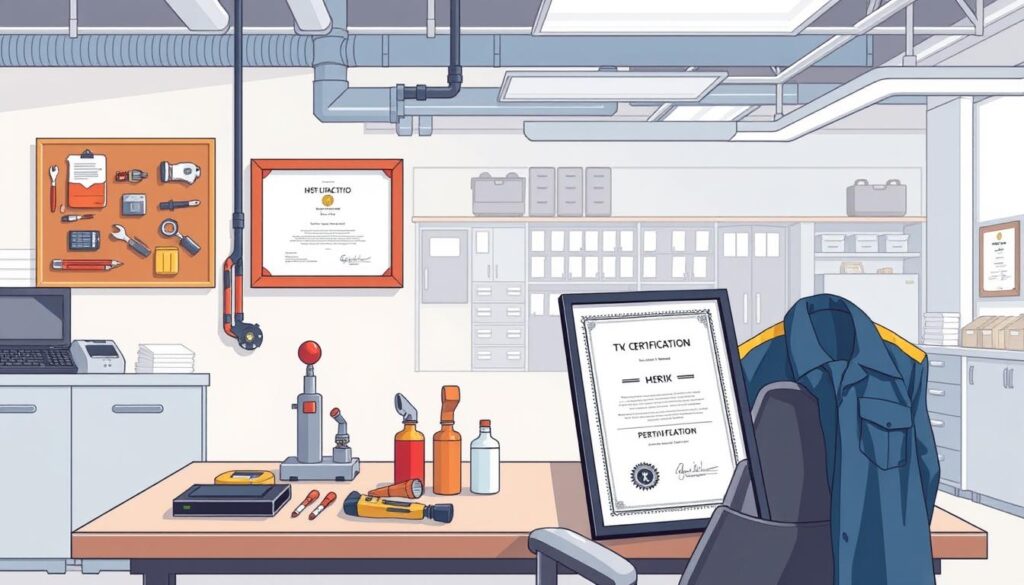Affiliate Disclosure
HVAC Guide Guys is a participant in the Amazon Services LLC Associates Program, an affiliate advertising program designed to provide a means for sites to earn advertising fees by advertising and linking to Amazon.
Do I Need a Diploma for HVAC? Are you thinking about a career in the HVAC (Heating, Ventilation, and Air Conditioning) field? Wondering if a diploma is needed? Knowing the educational needs and training choices is key to starting your career. This guide will cover everything about HVAC education, helping you decide your next steps.

Key Takeaways
- A diploma or certificate program in HVAC is typically required to become a licensed HVAC technician.
- HVAC training programs provide fundamental knowledge of HVAC systems, tools, and techniques.
- Graduates of HVAC programs are qualified for entry-level apprentice positions, where they continue learning under supervision.
- Formal HVAC education can be more comprehensive than on-the-job training, which is often limited during peak seasons.
- Completing an HVAC program can enhance your chances of success in the job market by providing technical skills and professional certifications.
Table of Contents
Understanding HVAC Career Fundamentals
If you’re thinking about a career in HVAC, you’re in the right place. The path to becoming a skilled technician is clear. You don’t need much to start, just a high school diploma or GED. But, the HVAC field offers many chances for those who want to learn and grow.
Basic Requirements for Entry
Most HVAC technician programs last about a year, sometimes 9 months. They teach you everything you need to know. Plus, many states ask for a high school diploma or GED to become certified.
Industry Overview and Growth Potential
The HVAC industry is growing fast, with a 15% increase in demand for technicians by 2026. This growth comes from the need for energy-saving systems and replacing old ones. HVAC experts help communities save energy and cut down on carbon emissions by installing smart systems.
Career Opportunities in HVAC
The HVAC field has many career paths, from homes to big buildings. You can specialize in areas like air conditioning or heating. With the right training, you can move up from apprentice to master technician.
Starting or changing careers in HVAC is a great move. Knowing the basics, the industry’s growth, and the many job options can set you up for success. HVAC is a dynamic and crucial field.
Explore Our HVAC Shop
Looking for top-rated HVAC tools, parts, and accessories? Visit our shop and find the perfect solution for your needs.
Visit the ShopDo I Need a Diploma for HVAC
An HVAC diploma is not always needed, but it’s key for getting licensed and moving up in the HVAC field. It gives you the knowledge and skills to start as a technician. You’ll be ready for apprenticeships and entry-level jobs.
Some employers might hire you without a diploma. But, without it, you’ll miss out on career growth and getting licensed. An HVAC diploma shows you’re serious about your career. It also gives you the skills that employers want.
| HVAC Diploma Requirements | HVAC Certification Requirements |
|---|---|
|
|
An HVAC diploma is not always needed, but it’s key for getting licensed and moving up in the HVAC field.
Whether to get an HVAC diploma depends on your career goals and local job market needs. Formal HVAC education opens more job doors. It sets you up for success in this growing field.
HVAC Education and Training Options
There are many ways to start a career in HVAC. You can choose from trade schools, community colleges, or apprenticeships. Each path has its own benefits, fitting different learning styles and career goals.
Trade School Programs
Trade schools provide quick HVAC training, lasting 9-10 months. They focus on the technical skills needed for HVAC work. Students get hands-on experience with the latest equipment.
Community College Programs
Community colleges offer 2-year associate degrees in HVAC technology. These programs mix general education with HVAC training. They prepare students for various roles and may lead to a bachelor’s degree later.
Apprenticeship Opportunities
HVAC apprenticeships combine work experience with classroom learning. They last 2-5 years and let you earn while learning. You’ll work with experts and learn about HVAC systems in depth.
| HVAC Education Option | Program Length | Median Annual Salary* |
|---|---|---|
| Trade School Programs | 9-10 months | $50,590 |
| Community College Programs | 2 years | $50,590 |
| HVAC Apprenticeships | 2-5 years | $50,590 |
*According to the Bureau of Labor Statistics, the median annual salary for HVAC technicians was $50,590 as of May 2020.
“Employers are increasingly seeking job applicants with some level of experience due to the rising complexity of HVAC equipment.”
Explore Our HVAC Shop
Looking for top-rated HVAC tools, parts, and accessories? Visit our shop and find the perfect solution for your needs.
Visit the ShopCore Components of HVAC Training Programs
HVAC training programs are made to give future technicians the skills they need. They cover many areas, making sure students are ready for HVAC jobs. This includes installation, maintenance, and repair.
At the center of HVAC training are the basics of air flow, ventilation, and system checks. Students also learn about energy-saving systems. They understand how all these parts work together to make spaces comfortable.
Hands-on training is key in HVAC programs. It lets students practice what they’ve learned. They work with refrigeration, heat pumps, and more, gaining real-world skills.
Many programs also offer chances to work with professionals. This real-world experience helps students get ready for their careers. It gives them a deeper understanding of HVAC work.
| Core HVAC Curriculum Components | Hands-On Training | Career Preparation |
|---|---|---|
|
|
|
By finishing a full HVAC training program, students get the HVAC technical skills they need. They’re set for a good career in this growing field.
“HVAC training programs are designed to provide students with the hands-on experience and theoretical knowledge needed to excel in the field. From system diagnostics to energy-efficient operations, these programs cover the core components essential for a successful HVAC career.”
Essential Technical Skills and Knowledge
To become an HVAC technician, you need to know a lot about technical skills and system knowledge. You must understand air distribution systems, electrical theory, and refrigeration. These are key to doing well in the HVAC field.
Air Distribution Systems
HVAC techs must know a lot about air distribution systems. This includes ductwork, vents, and how to manage airflow. They need to size, install, and keep these systems working right. This is important for keeping air moving and temperatures controlled in buildings.
Electrical Theory and Controls
Knowing about electricity is very important for HVAC techs. They have to fix and install electrical parts in HVAC systems. They need to understand electrical theory, read wiring diagrams, and work with control systems like thermostats and automation systems.
Refrigeration Principles
HVAC systems use refrigeration, and techs need to know how it works. They must understand compressors, condensers, and evaporators. They also need to know how to handle and recover refrigerants safely, following EPA rules.
HVAC techs also need to know about safety, energy efficiency, and environmental rules. This helps them install, maintain, and fix HVAC systems safely and responsibly.
| Technical Skill | Description |
|---|---|
| Air Distribution Systems | Understanding ductwork, vents, and airflow management for efficient climate control |
| Electrical Theory and Controls | Proficiency in electrical components, wiring diagrams, and control systems |
| Refrigeration Principles | Knowledge of compressors, condensers, evaporators, and proper refrigerant handling |
| Safety and Regulations | Adherence to safety protocols and environmental regulations, such as EPA guidelines |
“Becoming an HVAC technician requires a diverse skillset that extends beyond just repairing and installing equipment. Mastering the technical aspects of air distribution, electrical systems, and refrigeration is crucial for success in this field.”
Explore Our HVAC Shop
Looking for top-rated HVAC tools, parts, and accessories? Visit our shop and find the perfect solution for your needs.
Visit the ShopCertification and Licensing Requirements
Getting into the HVAC world means understanding HVAC certification and HVAC licensing. Each state has its own rules. You might need a license or certification to work legally.
The EPA Section 608 Certification is a big deal. It’s needed to work with refrigerants. You pass a test to show you know how to handle refrigerants right.
States also have their own licenses. These can be for basic work or for special skills. You’ll need training, experience, and a test to get these licenses.
| State | HVAC Certification and Licensing Requirements |
|---|---|
| Alabama | HVAC contractors must have held an apprenticeship certificate, provide transcripts showing graduation from an approved course, or show proof of at least 3,000 hours (18 months) of work experience under a licensed contractor to qualify for the exam. |
| Alaska | HVAC contractors have various categories available under the Mechanical Administrator license, each with different experience and education requirements. |
| Arizona | HVAC contractors need four years of experience in the specialty they are applying for or two years of experience plus graduation from a course or apprenticeship to qualify for a license. |
Rules change a lot from state to state. It’s key for future HVAC techs to check their local HVAC technician requirements. Knowing the rules helps you start a great career in HVAC.

HVAC Program Duration and Cost Considerations
Thinking about a career in HVAC? The program’s length and cost are key things to think about. HVAC programs vary a lot in how long they last and how much they cost. It’s important to find a program that fits your goals and budget.
Program Length Options
HVAC training can last from 6 weeks to 24 months. Certificate programs usually take 6-12 weeks. Associate’s degree programs at community colleges can take up to two years. Longer programs offer more training but cost more.
Financial Investment Overview
The cost of HVAC training can vary a lot. The HVAC program duration is a big factor. On average, a one-year program at a trade school costs between $15,000 and $20,000, before financial aid. But, costs can range from $1,500 for a certification to $35,000 for an associate’s degree.
The type of HVAC education you choose affects the cost. This includes trade schools, community colleges, apprenticeships, or online programs. Other factors like program length, school reputation, location, and financial aid options also play a role in the final cost.
| HVAC Training Program | Typical Duration | Average Cost |
|---|---|---|
| HVAC Certification | 6-12 weeks | $1,200 – $15,000 |
| HVAC Associate’s Degree | 2 years | $15,000 – $35,000 |
To make HVAC training more affordable, look into financial aid like scholarships and grants. Many HVAC companies also help with tuition reimbursement or sponsorship for their employees’ education.
Explore Our HVAC Shop
Looking for top-rated HVAC tools, parts, and accessories? Visit our shop and find the perfect solution for your needs.
Visit the ShopCareer Advancement and Specializations
As an HVAC technician, you can grow your career in many ways. The U.S. Bureau of Labor Statistics (BLS) says the HVAC field will grow by 13% from 2018 to 2028. This is faster than the 5% growth for all jobs. It shows there are many chances for HVAC pros to move up and find new roles.
Getting more certifications and specializing can help you advance. You can focus on commercial refrigeration, industrial HVAC, or energy management. You might also become a supervisor, start your own business, or work in sales or design.
The HVAC field also has many other jobs. You can work in customer service, manage inventory, or oversee safety. These roles let you use your technical skills and try new things.
The HVAC industry is stable and rewarding. With more knowledge and certifications, you can find many exciting jobs. You’ll make a big difference in the field.
“The fastest-growing job in the United States is a solar photovoltaic installer, expected to grow by more than 105% from 2016 to 2026, according to BLS data. Wind turbine technician roles follow closely as the second fastest-growing job, projected to increase by about 96% from 2016 to 2026.”

As the HVAC industry changes, technicians with special skills will be needed more. You can focus on green tech, industrial refrigeration, or other areas. By learning more and keeping up with trends, you can have a successful and fulfilling HVAC career.
Salary Expectations and Job Outlook
Starting a career in HVAC (Heating, Ventilation, and Air Conditioning) can be very rewarding. It offers good HVAC salaries and a bright HVAC job outlook. The median annual salary for HVAC technicians in the U.S. was $51,390 as of May 2022. But, salaries can change based on experience, location, and specialization.
Beginners in HVAC can make about $37,410 a year on average. More experienced technicians can earn up to $71,420 annually. Plus, overtime can add $6,750 to their yearly income.
The HVAC industry is growing fast. The U.S. Bureau of Labor Statistics says there will be a 5% increase in jobs from 2020 to 2030. This growth is due to new buildings, older system updates, and a focus on saving energy. By 2028, the industry will need 46,000 more workers.
With a high demand for skilled HVAC technicians and good salaries, this field is very promising. It’s a great choice for those starting or looking to grow in their career. The HVAC industry offers many chances for professional and financial success.
Environmental Protection Agency (EPA) Requirements
As an HVAC technician, knowing EPA rules is key. The EPA’s Section 608 Certification is a must for all HVAC pros who work with refrigerants. This ensures they know how to handle and dispose of these materials safely, protecting our environment.
EPA Section 608 Certification Types
The EPA Section 608 Certification has four types. Each is for different HVAC equipment and how to handle refrigerants:
- Type I: Small Appliances
- Type II: High-Pressure Appliances
- Type III: Low-Pressure Appliances
- Universal: All Types of Equipment
Certification Process and Testing
To get the EPA Section 608 Certification, you must pass a written exam. It covers the equipment types and how to handle refrigerants. The exam is given by groups like the ESCO Institute, which offers study materials and tests.
Some states, like Massachusetts, have extra rules for HVAC techs who work with refrigerants. California and Texas also have their own rules. Knowing your state’s rules is important for a successful HVAC career.
“The EPA Section 608 Certification is a critical requirement for HVAC technicians, ensuring the safe and responsible handling of refrigerants to protect the environment.”
Getting the EPA Section 608 Certification shows HVAC techs care about the environment. It proves they can work with refrigerants safely and follow the rules. This certification is great for HVAC pros, improving their skills, opening more job doors, and helping the industry be more sustainable.
Conclusion
While you don’t need a formal diploma, getting an HVAC career guide is key. It mixes education, certifications, and hands-on experience. The HVAC industry outlook is bright, with lots of chances for skilled workers in different areas.
Getting the right technical knowledge and skills is crucial. Also, getting recognized certifications helps a lot. You can go to a trade school, community college, or do an apprenticeship. The main thing is to get good training for the HVAC field’s changing needs.
The HVAC industry is growing and changing fast. It’s important to keep learning and be flexible. By getting the right certifications and improving your problem-solving, you can have a great career. With education, training, and hard work, your HVAC career can be both rewarding and profitable.
FAQ
Do I need a diploma to become an HVAC technician?
What are the typical requirements for an entry-level HVAC technician?
How important is an HVAC diploma for career advancement?
What HVAC education options are available?
What do HVAC training programs cover?
What are the essential HVAC skills and knowledge?
What are the certification and licensing requirements for HVAC technicians?
How long do HVAC training programs typically last, and what is the cost?
Do I need a diploma to become an HVAC technician?
What are the typical requirements for an entry-level HVAC technician?
How important is an HVAC diploma for career advancement?
What HVAC education options are available?
What do HVAC training programs cover?
What are the essential HVAC skills and knowledge?
What are the certification and licensing requirements for HVAC technicians?
How long do HVAC training programs typically last, and what is the cost?
FAQ
Do I need a diploma to become an HVAC technician?
Yes, you need a diploma from a trade or technical college to be a licensed HVAC technician. This education teaches the basics of HVAC systems, tools, and techniques. It prepares you for apprentice positions.
What are the typical requirements for an entry-level HVAC technician?
To be an entry-level HVAC technician, you need a high school diploma or GED. The HVAC field is growing fast. The Bureau of Labor Statistics says there will be over 38,500 new jobs by 2030.
How important is an HVAC diploma for career advancement?
An HVAC diploma is key for getting licensed and moving up in your career. It gives you the knowledge and skills needed for apprenticeships and entry-level jobs. While some employers might hire without a diploma, you’ll miss out on better jobs and licenses without it.
What HVAC education options are available?
You can get HVAC education through trade schools, community college associate degrees, or apprenticeships. Trade schools offer quick, focused programs. Community colleges provide more in-depth education. Apprenticeships combine work experience with classroom learning, lasting 2-5 years.
What do HVAC training programs cover?
HVAC training covers a lot, like air distribution, maintenance, and electronics. You’ll learn about control circuits, HVAC accessories, and refrigeration. Programs include hands-on lab work and may offer externships for real-world experience.
What are the essential HVAC skills and knowledge?
Key HVAC skills include understanding air systems, electrical theory, and refrigeration. You need to know how to work with different HVAC parts, diagnose problems, and do repairs and installations. Safety, energy efficiency, and environmental rules are also important.
What are the certification and licensing requirements for HVAC technicians?
Licensing rules for HVAC technicians vary by state. Many states require a license, which means completing an accredited program, gaining experience, and passing an exam. You might also get certifications like EPA Section 608 or NATE.
How long do HVAC training programs typically last, and what is the cost?
HVAC programs last from 6-24 months for certificates or associate degrees. Certification programs cost between
FAQ
Do I need a diploma to become an HVAC technician?
Yes, you need a diploma from a trade or technical college to be a licensed HVAC technician. This education teaches the basics of HVAC systems, tools, and techniques. It prepares you for apprentice positions.
What are the typical requirements for an entry-level HVAC technician?
To be an entry-level HVAC technician, you need a high school diploma or GED. The HVAC field is growing fast. The Bureau of Labor Statistics says there will be over 38,500 new jobs by 2030.
How important is an HVAC diploma for career advancement?
An HVAC diploma is key for getting licensed and moving up in your career. It gives you the knowledge and skills needed for apprenticeships and entry-level jobs. While some employers might hire without a diploma, you’ll miss out on better jobs and licenses without it.
What HVAC education options are available?
You can get HVAC education through trade schools, community college associate degrees, or apprenticeships. Trade schools offer quick, focused programs. Community colleges provide more in-depth education. Apprenticeships combine work experience with classroom learning, lasting 2-5 years.
What do HVAC training programs cover?
HVAC training covers a lot, like air distribution, maintenance, and electronics. You’ll learn about control circuits, HVAC accessories, and refrigeration. Programs include hands-on lab work and may offer externships for real-world experience.
What are the essential HVAC skills and knowledge?
Key HVAC skills include understanding air systems, electrical theory, and refrigeration. You need to know how to work with different HVAC parts, diagnose problems, and do repairs and installations. Safety, energy efficiency, and environmental rules are also important.
What are the certification and licensing requirements for HVAC technicians?
Licensing rules for HVAC technicians vary by state. Many states require a license, which means completing an accredited program, gaining experience, and passing an exam. You might also get certifications like EPA Section 608 or NATE.
How long do HVAC training programs typically last, and what is the cost?
HVAC programs last from 6-24 months for certificates or associate degrees. Certification programs cost between $1,200-$15,000, including tools and exam fees. Community college programs might have different prices. Apprenticeships offer paid training.
What are the career advancement opportunities in the HVAC field?
HVAC technicians can grow their careers with more certifications, specializations, and experience. You can specialize in commercial refrigeration, industrial systems, or energy management. With time, you can become a supervisor, start your own business, or move into sales or design.
What is the average salary and job outlook for HVAC technicians?
As of May 2020, HVAC technicians made a median of $50,590, with top earners over $80,820. With experience and specialization, your salary can go up. The job outlook is good, with 5% growth expected from 2020-2030. Demand is driven by new buildings, updating old systems, and focusing on energy efficiency.
What is the EPA Section 608 Technician Certification, and why is it important?
The EPA Section 608 Technician Certification is needed for HVAC technicians working with refrigerants. There are four types of certification: Type I, Type II, Type III, and Universal. You need to pass a written exam on specific equipment and refrigerant handling.
,200-,000, including tools and exam fees. Community college programs might have different prices. Apprenticeships offer paid training.
What are the career advancement opportunities in the HVAC field?
HVAC technicians can grow their careers with more certifications, specializations, and experience. You can specialize in commercial refrigeration, industrial systems, or energy management. With time, you can become a supervisor, start your own business, or move into sales or design.
What is the average salary and job outlook for HVAC technicians?
As of May 2020, HVAC technicians made a median of ,590, with top earners over ,820. With experience and specialization, your salary can go up. The job outlook is good, with 5% growth expected from 2020-2030. Demand is driven by new buildings, updating old systems, and focusing on energy efficiency.
What is the EPA Section 608 Technician Certification, and why is it important?
The EPA Section 608 Technician Certification is needed for HVAC technicians working with refrigerants. There are four types of certification: Type I, Type II, Type III, and Universal. You need to pass a written exam on specific equipment and refrigerant handling.

